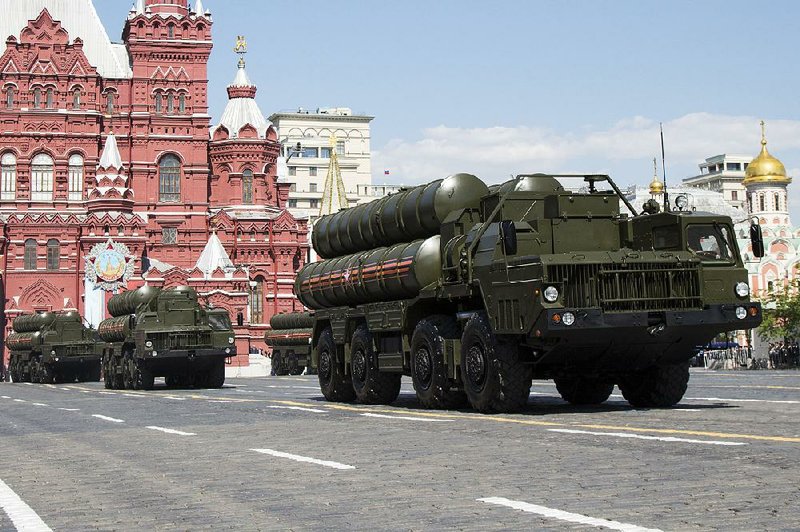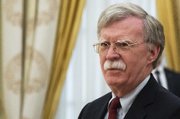MOSCOW -- U.S. national security adviser John Bolton faces two days of high-tension talks in Moscow beginning today after President Donald Trump announced his intention to withdraw from a landmark nuclear weapons treaty.
Trump's announcement that the United States would leave the Intermediate-Range Nuclear Forces Treaty brought sharp criticism on Sunday from Russian officials and from former Soviet President Mikhail Gorbachev, who signed the treaty in 1987 with President Ronald Reagan.
Trump said Russia has violated terms of the treaty that prohibit the U.S. and Russia from possessing, producing or test-flying ground-launched nuclear cruise missiles with a range of 300 to 3,400 miles.
Russia has repeatedly denied allegations that it has produced and tested such a missile.
Deputy Foreign Minister Sergei Ryabkov was quoted as telling state news agency Tass that leaving the treaty "would be a very dangerous step."
It would "cause the most serious condemnation from all members of the international community who are committed to security and stability."
Konstatin Kosachev, head of the foreign affairs committee in Russia's upper house of parliament, said on Facebook that a U.S. withdrawal from the treaty would mean "mankind is facing full chaos in the nuclear weapons sphere."
Gorbachev, who is now 87 years old, cast Trump's decision as a threat to peace.
"Washington's desire to turn back politics cannot be supported. Not only Russia, but also all who cherish the world, especially a world without nuclear weapons, must declare this," Gorbachev said in an interview with the Interfax news agency.
"Under no circumstances should we tear up old disarmament agreements," he said. "Is it really that hard to understand that rejecting these agreements is, as the people say, not the work of a great mind?"
Gorbachev in the interview called Trump's rollback of the disarmament agreement "very strange."
"Rejecting the [Intermediate-Range Nuclear Forces Treaty] is a mistake," he said. "Do they really not understand in Washington what this can lead to?"
Western reaction was mixed.
British Defense Secretary Gavin Williamson said the U.K. stands "absolutely resolute" with Washington on the issue and called on the Kremlin to "get its house in order," according to the Financial Times.
German Foreign Minister Heiko Maas said that Trump's announcement "raises difficult questions for us and Europe," but noted that Russia hasn't cleared up allegations of violating the treaty.
The Kremlin hasn't directly commented on Trump's statement, but spokesman Dmitry Peskov said Sunday that "after the last statements, explanations of the American side will be required." Bolton and Russian President Vladimir Putin will meet on Tuesday. Today, Bolton meets with Foreign Minister Sergey Lavrov.
"I hope we're not moving down the path to undo much of the nuclear arms control treaties that we have put in place," Senate Foreign Relations Committee Chairman Sen. Bob Corker, R-Tenn., said Sunday on CNN's State of the Union, noting that he had heard that the Trump administration wanted to pull out of not only the Intermediate-Range Nuclear Forces Treaty but also New START.
"I think that would be a huge mistake," Corker said.
New START seeks to limit the stockpiles of long-range and submarine missiles and heavy bombers, plus related warheads and launchers, in U.S. and Russian possession. Corker played a leading role in helping the Senate ratify an updated extension of the treaty in 2010; but its future is in doubt, as it expires in early 2021.
Though it takes a two-thirds vote of Congress to ratify a treaty, there is no constitutionally mandated congressional role in tearing one up.
Corker said Trump's announcement to pull out of the Intermediate-Range Nuclear Forces Treaty came as a surprise -- and one he hoped was simply presidential bluster.
"This could be something that is just a precursor to try to get Russia to come into compliance," Corker said, guessing that Trump might be attempting a power play to influence Russia's stance on nuclear arms control treaties as he did with the parties to NAFTA to affect trade policy. But Corker warned that unless the United States was ready to compete with Russia, "they're going to move ahead of us quickly."
Sen. Rand Paul, R-Ky., pointed the finger at Bolton, saying on Fox News that he is likely the one advising Trump to withdraw and "I don't think he recognizes the important achievement of Reagan and Gorbachev on this."
"It's a big, big mistake to flippantly get out of this historic agreement," Paul said on Fox News Sunday. "I'm all for trying to sign an agreement with China, but that would have to be a brand-new agreement. It's no reason to end the agreement we have with Russia."
Paul encouraged Trump to appoint nuclear negotiators to work on updating and expanding the pact, and "have a rational discussion with experts on this and see if we can resolve it." But he insisted that Bolton play no part in that treaty discussion.
TENSIONS RISING
The prospect of withdrawing from the Intermediate-Range Nuclear Forces Treaty adds to the substantial tensions between Washington and Moscow, including allegations of Russian meddling in the 2016 presidential election and sanctions imposed over Russia's involvement in the eastern Ukraine conflict.
On Friday, the U.S. announced criminal charges against a Russian over allegations of attempting to influence next month's midterm elections.
The treaty helps protect the security of the U.S. and its allies in Europe and the Far East, but has constrained the U.S. from developing new weapons.
The U.S. will begin developing them unless Russia and China agree not to possess or develop the weapons, Trump said. China isn't a party to the pact.
"We'll have to develop those weapons, unless Russia comes to us and China comes to us and they all come to us and say 'let's really get smart and let's none of us develop those weapons,' but if Russia's doing it and if China's doing it, and we're adhering to the agreement, that's unacceptable," Trump said.
He didn't provide details about violations. But in 2017, White House national security officials said Russia had deployed a cruise missile in violation of the treaty. Earlier, the Obama administration accused the Russians of violating the pact by developing and testing a prohibited cruise missile.
Russia has repeatedly denied that it has violated the treaty and has accused the U.S. of not being in compliance.
Defense Secretary James Mattis has previously suggested that a Trump administration proposal to add a sea-launched cruise missile to Washington's nuclear arsenal could provide the U.S. with leverage to try to persuade Russia to come back in line on the arms treaty.
Russia's Foreign Ministry said in February that the country would only consider using nuclear weapons in response to an attack involving nuclear or other weapons of mass destruction, or in response to a non-nuclear assault that endangered the survival of the Russian nation.
Trump's decision could prove controversial with European allies and others who see value in the treaty, said Steven Pifer, a former U.S. ambassador to Ukraine and now a senior fellow at the Brookings Institution who focuses on nuclear arms control.
"Once the United States withdraws from the treaty, there is no reason for Russia to even pretend it is observing the limits," he wrote in a post on the organization's website. "Moscow will be free to deploy the 9M729 cruise missile, and an intermediate-range ballistic missile if it wants, without any restraint."
In the past, the Obama administration worked to persuade Moscow to respect the Intermediate-Range Nuclear Forces Treaty, but made little progress.
"If they get smart and if others get smart and they say 'let's not develop these horrible nuclear weapons,' I would be extremely happy with that, but as long as somebody's violating the agreement, we're not going to be the only ones to adhere to it," Trump said.
Information for this article was contributed by Jim Heintz and Thomas Strong of The Associated Press; by Karoun Demirjian of The Washington Post; and by Andrew E. Kramer of The New York Times.
A Section on 10/22/2018

